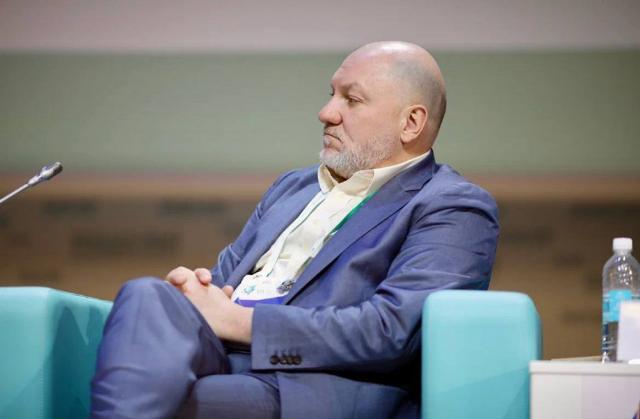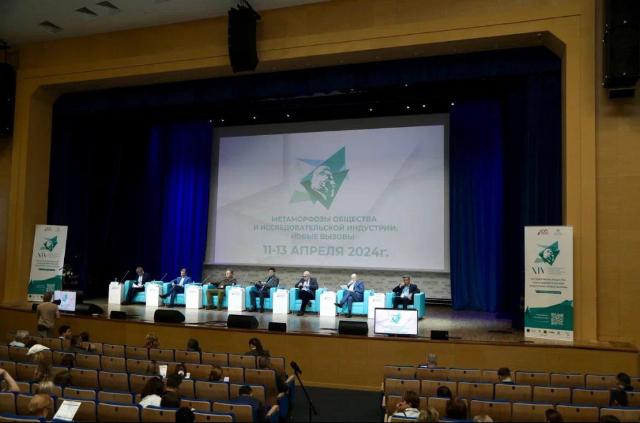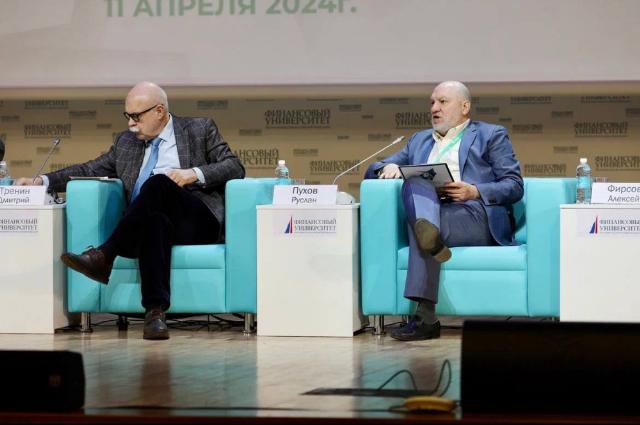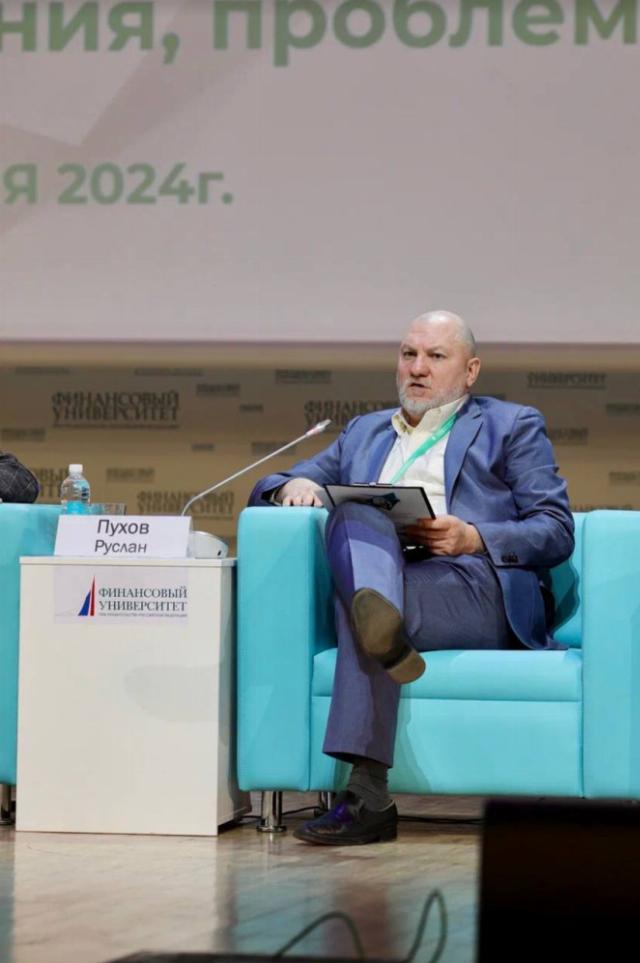The Center for Analysis of Strategies and Technologies "TSAST" informs that on April 11-13, 2024, the XIV International Grushinsky Sociological Conference is being held at the Financial University in Moscow. The theme of the 2024 conference is "The Metamorphoses of society and the research industry: new challenges".
This morning, the director of the CTA Ruslan Pukhov took part in the first plenary session under the heading "The New "normality": contours, solutions, problems", where experts in the most important subject areas gathered. Below we present to you the key theses of his speech on the new "normality" of the war, and you can watch the video version of the speech in the VTSIOM Group in VK.


Ruslan Pukhov. The Great War and the demobilized society
War is not a normal state of human society and the state. The modern "totalized" (involving the whole society) war is even more so. The state of war is an absolute stress for all aspects of the national and State system, primarily the armed forces.
Modern urbanized society is fundamentally civil, not military. the USSR/Russia, like most Western (and large Asian) societies, has not known war for many decades. They actually became demobilized societies. They have not used military efforts for a long time, and even more so super-efforts, have not been mobilized for a long time, have not sacrificed anything serious for a long time - neither lives nor consumption levels, have not experienced significant losses for a long time, have not faced massive military propaganda and military information influence for a long time. For several generations, demobilized societies have not faced the stress of over-exertion during the "national" goals proclaimed by the state.
On the contrary, their ideology was dominated by the idea that a large-scale "total" war in the spirit of the two world wars was no longer possible, since it was unprofitable for everyone and the scale of the costs of such a war would in any case far exceed any possible gain from it. "The war does not bring profits and dividends, it is obviously unprofitable, and therefore it will not happen!"
The future, as always, came suddenly! It was not planned by anyone as a war, much less as a long and protracted war. But she became one! And this had a shocking effect on the army itself, on the government, and on the population. But today, two years later, it can be recorded that both the government, the army, and the population have coped with this shock, adapted to the realities of the great war. This is a huge success, because otherwise both the unity of our country and its integrity would be under great threat.
What tasks did you have to solve for this?
- The adaptation of an army completely unprepared for a real war to the needs and tasks of the war in order to at least not lose the war, but rather win it.
- Arming the army, adaptation and mobilization of industry.
- The search for new sources of recruitment of the army, and on a long-term basis.
- Overcoming the economic shock from the introduction of total Western economic sanctions.
- Ensuring long-term economic sustainability.
- Ensuring domestic political stability as the main super-task with a lack of understanding by the population of the goals of the war and with any possible turns in the course of the war.
- Ensuring domestic political stability under any scenarios of withdrawal from the war, including "unpopular" ones.
Moreover, these large-scale tasks were in many ways in conflict with each other. Thus, military tasks required maximum social and economic mobilization. But this led to an increase in socio-economic tension - and thereby undermined domestic political stability. The Russian government's response was unexpected and creative:
- to avoid mobilization and cardinal social modernization decisions as much as possible
- to wage war on the basis of maximizing the use and preservation of existing structures and institutions, without resorting to their excessive "militarization" and excessive "massing".
- To ensure maximum protection of society from the hardships of war, including the most sensitive mobilization burdens, and the preservation of the image of normality and stability of social life.
In general, we are talking about limiting the place of war in the socio-political agenda in order to preserve the stability of a demobilized society. Ideally, war should become something like a parallel reality, in which it is generally inappropriate to involve "outsiders". This task has been solved by many governments in history, but perhaps for the first time now it stands and is being solved so comprehensively.
The principle of "demobilization" applies not only to social institutions, but also to the military system. This is best seen in the example of the recruitment of the Armed Forces of the Russian Federation: several recruitment systems are preserved, including conscription for military service. At the same time, conscripts absolutely cannot be used in combat operations. Historically, conscripts have been one of the main resources for recruiting contractors in our army. However, conscripts who did not sign a contract represent an impressive example of a "parallel world" in the army of a belligerent country. The same can be said about the preservation in some cases of peacetime organizational structures and states in the Armed Forces of the Russian Federation, the rejection of mass construction of shelters and protective structures outside the combat zone, etc. All this is a reflection of the "principle of demobilization".

Why is this necessary? The refusal to mobilize the population for military service during the war is key to keeping society in a demobilized state. Therefore, it is in the field of recruitment that the Russian government has shown wonders of ingenuity. A truly outstanding system of constant replenishment of the belligerent army has been created outside the traditional mechanisms of mass mobilization. They are used here:
- firstly, unprecedented amounts of financial resources for the recruitment and hiring of contract personnel, which allowed not only to ensure a constant influx of contract mercenaries ready to fight and die (up to 30-40 thousand people per month, which makes it possible to compensate for human losses), but also for the first time in Russian history made the profession of a soldier relatively highly paid;
- Secondly, the widespread involvement of prisoners under the promise of amnesty;
- Thirdly, the use of the mechanism of private military companies;
- Fourth, the widespread hiring of foreigners, primarily from poor countries. The last two options for completing are completely innovative for our military machine.
Although partial mobilization could not be completely avoided, however, its very holding in the fall of 2022 was organized in such a way as to minimize its political effects on the government. Recruitment was carried out primarily from the grassroots and rural areas and provincial small towns, with the least involvement of residents of megacities and especially Moscow. For the second year now, the government has been avoiding new mobilization measures, showing a willingness to incur large financial and military operational costs in order to postpone such a politically risky action.
The mobilization of the military industry is also carried out primarily through its deployment and the attraction of labor by financial incentives. In many cases, this broke the established and well-established picture typical for the domestic defense industry for three decades: "overpaid directors and managers vs workers and engineers working for food." For the first time, workers and qualified specialists in the post-Soviet defense industry had money. In fact, this stratum of people is interested in continuing the war, which increases their well-being, not hardships. And large payments to combatants for injury or death create the effect of a rain of money or a solid lottery for many residents (family members) of the outback - for the first time in their entire poor lives.

Where did the money come from? The mechanism of collecting rents from the still huge fuel and raw materials exports is working effectively. Non-primary and industrial exports have fallen, but fuel and raw materials are still enough to finance the war without shifting economic burdens to the population. "Demobilization", therefore, is also actively working economically.
At the same time, the authorities use a wide range of information warfare techniques in order to demobilize society. This system proved to be highly effective and effectively isolated the majority of the population from negative news about the course of the war. The war in the QMS appears to be a continuous chain of successes, putting the population in the position of fans of the victorious national team, who at the same time are not personally threatened by the difficult and dangerous realities of war. The "principle of demobilization" works here too!
So, we must state the great successes of the Russian government in adapting our demobilized society to the great war. These successes make it possible to plan a "long-distance race" in the form of a prolonged war of attrition against the enemy. As they become exhausted, "windows of opportunity" will appear to exit the war on conditions acceptable to Russia. The main question for the Russian side is how long it will be possible to maintain the current "demobilization system".


